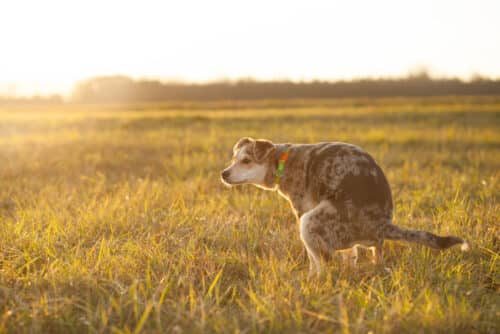Keep the Tail Wagging is supported by pet parents. I occasionally earn a commission (at no additional cost to you) when you click through an affiliate link to one of my favorite products. Thank you for your support. Read More
Cannabidiol (CBD) has become increasingly popular among pet parents for its ability to support calm behavior, joint health, immune function, and overall wellness in dogs. But not all CBD products are created equal. This article explains what CBD oil is, how to select a high-quality product, dosing guidelines, and how daily use can benefit your dog.
But first, let’s talk about the Endocannabinoid System.
What Is a Dog’s Endocannabinoid System?
A dog’s endocannabinoid system (ECS) is a natural network in the body made up of receptors, enzymes, and molecules that help keep everything in balance, like mood, sleep, appetite, immune response, and pain. Think of it as the body’s “master regulator.” When your dog feels anxious, sore, or inflamed, the ECS works to bring things back to normal. CBD and other cannabinoids support this system by helping it function better, without causing a “high.” All mammals, including dogs, have an ECS that plays a key role in their overall health and well-being.
The ECS includes endocannabinoid receptors (mainly CB1 and CB2) found in the brain, nervous system, immune cells, and organs.
When you give your dog CBD, it interacts with these receptors, helping the ECS maintain balance (homeostasis) in the body. For example, if your dog is anxious, inflamed, or in pain, CBD can help calm those responses by gently influencing how the ECS regulates them.
Why Does This Matter for Dogs?
Because dogs naturally have an endocannabinoid system, CBD can:
- Reduce anxiety and stress
- Help manage pain and arthritis
- Support healthy immune and inflammatory responses
- Improve appetite and digestion
- Promote better sleep
It’s like giving their body a plant-based boost that works with their natural systems — not against them.
Defining CBD Oil
CBD oil is an extract made from the hemp plant (Cannabis sativa) that contains cannabidiol (CBD) — a non-psychoactive compound known for its calming, anti-inflammatory, pain-relieving, and anxiety-reducing effects.
Unlike THC (tetrahydrocannabinol), which is the compound in marijuana that causes a “high,” CBD does not make dogs feel intoxicated or stoned. It works gently in the body to support overall balance and wellness.
What Are CBD, CBG, CBDa, and CBN?
CBD, CBG, CBDa, and CBN are cannabinoids, naturally occurring compounds found in the hemp plant:
- CBD (Cannabidiol): The most widely used cannabinoid in pet wellness. It's non-psychoactive and supports relaxation, pain management, joint health, and the control of inflammation.
- CBG (Cannabigerol): Often called the “mother cannabinoid” because it's the precursor to other cannabinoids. CBG has shown promise in alleviating inflammation, improving digestion, and supporting the immune system.
- CBDa (Cannabidiolic Acid): The raw, unheated version of CBD. It may be more bioavailable and has anti-nausea and anti-inflammatory effects.
- CBN (Cannabinol): A mildly psychoactive cannabinoid often used for promoting sleep and relaxing overactive nervous systems.
Each of these compounds interacts with your dog’s endocannabinoid system to help regulate mood, inflammation, appetite, and pain.
CBD vs. Hemp Seed Oil
Several products sold online and in pet stores are labeled as hemp seed oil and claim to offer the same calming benefits of CBD oil. In some cases, brands use “hemp” to get around rules that disallow the sale of CBD oil online and in certain countries. It's important to understand that CBD and hemp extract may be the same, but CBD and hemp seed oil aren't the same.
| Feature | Hemp Seed Oil | CBD Oil |
|---|
| Part of the Plant Used | Hemp seeds | Hemp flowers, leaves, and stalks |
| Contains CBD? | No | Yes |
| Main Benefit | Skin and coat health (Omega 3/6 fatty acids), anti-inflammatory, cellular health, and nutrients in small amounts: magnesium, potassium, iron, zinc, and calcium | Calming, pain relief, inflammation, seizures, and immune system balance |
| Legal & Safe? | Yes | Yes (when THC is under 0.3%) |
| Common Use | Nutritional oil, daily supplement | Therapeutic support for wellness issues |
CBD oil and hemp seed oil can be used together.
The Difference Between CBD and THC
CBD (cannabidiol) and THC (tetrahydrocannabinol) are both compounds found in the cannabis plant, but they have very different effects. THC is the psychoactive compound that causes a “high” in humans and can be toxic to dogs. In contrast, CBD is non-psychoactive and completely safe when derived from the hemp plant, which by law contains less than 0.3% THC. Quality pet CBD oils are formulated to be THC-free or contain only trace, non-intoxicating amounts, ensuring they won’t make your dog feel “high” or sedated. Instead, CBD gently supports your dog’s nervous system, mood, and mobility—without altering their personality or behavior.
While THC (tetrahydrocannabinol) is widely known for its psychoactive effects in humans, it has also been studied for its therapeutic potential in managing cancer symptoms. In veterinary contexts, low-dose THC, when used carefully and under veterinary supervision, may offer benefits for dogs with cancer.
Potential Benefits of THC for Dogs with Cancer
In carefully controlled situations, THC may provide the following benefits:
- Appetite Stimulation: THC is well-known for encouraging eating, which can help dogs experiencing cancer-related anorexia or weight loss.
- Pain Management: THC has analgesic (pain-relieving) properties, which may support dogs with chronic or cancer-related pain.
- Anti-Nausea Effects: THC may help reduce nausea and vomiting associated with chemotherapy.
- Anti-Tumor Activity: Preliminary research in rodent and cell models suggests THC may slow tumor growth or induce cancer cell death (apoptosis), but more veterinary-specific studies are needed to confirm these effects in dogs.
Risks and Cautions of THC for Dogs
Despite its potential, THC is not generally recommended for use in dogs without expert guidance because:
- Dogs are much more sensitive to THC than humans and can easily become intoxicated. This can lead to ataxia (loss of coordination), excessive drooling, lethargy, low blood pressure, urinary incontinence, anxiety, and even seizures.
- Overdose or inappropriate dosing may require emergency care.
- THC toxicity can last 12–72 hours, causing extreme distress for both dog and owner.
Veterinary Supervision Is Critical
If a veterinarian with expertise in cannabinoid medicine determines that low-dose THC could be beneficial, it is typically used in small, precisely measured amounts alongside CBD. CBD may help buffer or mitigate the psychoactive effects of THC, allowing for a more balanced response.
Veterinary cannabis formulas often use a CBD:THC ratio of 20:1 or higher, delivering therapeutic effects while minimizing psychoactivity.
How to Choose a High-Quality CBD Oil for Dogs
The CBD market is unregulated, which means poor-quality and even dangerous products are common. Here’s how to find a premium product:
- Full- or Broad-Spectrum Extracts: These retain a range of cannabinoids and terpenes that work synergistically (the “entourage effect”). Avoid products labeled as “CBD isolate” unless you need pure CBD without other compounds.
- Organic Hemp Plants: Choose CBD oil made from organically grown hemp plants. This avoids pesticides and heavy metals that could harm your dog.
- Third-Party Lab Testing: A trustworthy brand will publish COAs (Certificates of Analysis) for every batch to show potency, purity, and no toxins or synthetic additives. If the COA isn't on their website, contact them to request a copy.
- Natural Ingredients Only: Look for formulas without artificial flavorings (peanut butter, bacon, etc.), preservatives, or chemical solvents.
When choosing CBD oil, only use products labeled explicitly for pets and formulated by experts in pet aromatherapy or veterinary herbalism.
Types of CBD Oil: Full Spectrum vs. Broad Spectrum vs. Isolate
Unless your veterinarian agrees, don't let a brand convince you that an isolate is what your dog needs. I prefer full-spectrum products because they utilize all parts of the plant, creating a strong entourage effect where all compounds of the hemp plant work together for magnified benefits.
| Type | Contains THC? | Other Cannabinoids? | Entourage Effect? | Best For |
|---|---|---|---|---|
| Full Spectrum | Trace (<0.3%) | Yes | Strong | Whole-body support, chronic issues |
| Broad Spectrum | None | Yes | Moderate | Sensitive pets needing extra support |
| Isolate | None | No | No | Very specific or mild support needs |
Why You Should Avoid Products With Synthetics
Some cheaper CBD oils contain synthetic cannabinoids or non-hemp-derived CBD, which can be unpredictable and even dangerous. These synthetics:
- Lack the natural entourage effect
- May be too potent and poorly tolerated by pets
- Can cause toxicity or side effects
- Are often used in unregulated black-market products
Always choose a reputable company that uses hemp-derived, naturally occurring cannabinoids.
CBD Oil with Essential Oils: Risks and Benefits
Some pet CBD oils are infused with essential oils, such as lavender, chamomile, or frankincense. These can offer added calming or anti-inflammatory benefits, but there are cautions:
Benefits:
- Lavender and chamomile may promote calm behavior
- Frankincense may support immune health and pain relief
Risks:
- Dogs may be sensitive to the essential oils
- Poorly formulated products may contain toxic levels
- Not all essential oils are safe for ingestion
- Essential oils add a strong taste that some dogs may not enjoy
This is not to say that CBD oils that use essential oils are bad. CBD Dog Health, for instance, is highly effective with dogs with serious health issues, including allergies, severe anxiety, and various diseases, including cancer.
Giving CBD Oil to Dogs
I give my dogs CBD oil daily for anxiety, to reduce inflammation, boost immunity, and support overall wellness.
Simple CBD Dosage for Dogs (by Weight)
CBD oil products provide dosage guidelines based on weight and milligrams (mg). When new to CBD oil, start low and slow, and adjust as needed:
- Low Dose: 0.25 mg CBD per pound of body weight
- Medium Dose: 0.5 mg/lb
- High Dose: 1 mg/lb
For example, a 40-pound dog might start with 10 mg/day and adjust based on the response. For consistent benefits, some brands recommend splitting the doses between morning and night.
Daily Use vs. As-Needed Use
Many pet parents wait until their dog is anxious or in visible pain to use CBD, but daily use offers greater support:
Daily Use Benefits:
- Maintains a consistent level of cannabinoids in the body
- Reduces baseline inflammation
- Supports aging joints and mobility
- Balances the endocannabinoid system
As-Needed Use:
- Beneficial for acute stress (thunderstorms, vet visits, car rides)
- May not be as effective without regular use to “prime” the system
How to Best Give Dogs CBD Oil
Some brands recommend giving CBD to dogs by adding the oil to their mouths, along their gumline, while others suggest adding CBD oil to their meals. While both options are valid, which is more beneficial?
Giving CBD Oil Directly in the Mouth (Along the Gumline): When CBD oil is placed directly onto the gums or under the tongue, it's absorbed through the mucous membranes. This allows the CBD to enter the bloodstream quickly and efficiently, often within 15-30 minutes. This method is ideal when you are looking for quick relief from anxiety, pain, or sudden stress (like thunderstorms or fireworks). Adding the CBD oil along the gumline also allows for more precise dosing, as you know precisely how much CBD your dog is getting, without losing any through the digestive process.
Adding CBD Oil to Food: Mixing CBD oil into your dog's meal is simple, especially for dogs that are picky eaters or resist direct dosing. CBD oil added to meals may also be gentler on the stomach, as some dogs tolerate CBD oil better when it's given with food, as it can slow absorption and reduce mild stomach upset. Because CBD is digested, it may take longer to take effect (45-90 minutes), but it can provide more gradual and longer-lasting relief.
Determining which method is best depends on the dog and desired results. For fast-acting relief (like sudden anxiety or pain), direct gumline application is more effective. For daily wellness support or when convenience matters, adding to food is a good option. And, you can mix and match, giving CBD directly for acute issues and adding it to food for ongoing, daily use.
When Can Dogs Start Taking CBD Oil?
Dogs can start taking CBD oil at around 6 months old, once their liver and kidneys are more developed. Always consult with a holistic or integrative veterinarian before introducing CBD to young puppies or dogs that are on medication.
CBD Oil vs. CBD Treats
CBD Oil:
- Faster absorption (15–30 minutes)
- More precise dosing
- Longer shelf life
- Better for dogs with allergies (few ingredients)
CBD Treats:
- Easier to give
- Tasty and convenient
- Less bioavailable due to digestive processing
- Dosing may be less consistent
I use oil for daily support, and keep treats on hand for travel or convenience. I only buy CBD treats from one company, Earth Buddy Pet, as my dogs have consistently experienced the calming benefits.
CBD vs. Functional Mushrooms
While both CBD oil and functional mushrooms support immunity and overall wellness, they work differently:
| Feature | CBD | Functional Mushrooms |
|---|
| Source | Hemp plant | Fungi (e.g., Reishi, Lion’s Mane) |
| Key Benefits | Calming, inflammation, pain | Immunity, cognitition, stress resilience |
| Daily Use | Regulates mood & discomfort | Balances immune function |
| Interaction | Endocannabinoid system | Nervous and immune systems |
CBD oil and functional mushrooms can be used together as they work synergistically to promote overall wellness.
Why I Use Earth Buddy Pet CBD Products
Earth Buddy Pet stands out for several reasons:
- Whole-Plant Extracts: Their formulas retain cannabinoids, including CBD, CBG, and CBDa, as well as terpenes, offering full-spectrum support.
- Organically Grown Hemp: Their hemp is grown in Colorado without the use of pesticides, ensuring purity and safety.
- Lab-Tested Transparency: Earth Buddy publishes batch-specific third-party lab results, ensuring potency and safety verification.
- Innovative Formulas: Earth Buddy blends CBD with ingredients like functional mushrooms and adaptogens for layered benefits.
- Pet-Specific Expertise: Their products are specifically designed for animals, featuring pet-safe concentrations, ingredients, and delivery systems.
- Affordable: Earth Buddy Pet products are within my budget for my dogs. I have two products on recurring order, and stock up on other products when they're on sale.
My Earth Buddy Pet Shopping List
- Recurring Order: Balance Hemp Extract, 500 mg
- For Recovery: Cellular Support, 500 mg
- CBD Dog Treats: Extra Strength Hemp Hearts
- For Allergies: Allergy & Immune Support Tincture
CBD oil can be a powerful tool in your dog's natural wellness plan—but only if you choose the right product. Stick with organic, full-spectrum oils from reputable companies like Earth Buddy Pet and CBD Dog Health, dose mindfully, and use them regularly for best results. Whether your dog is facing arthritis, separation anxiety, or general aging concerns, CBD may offer gentle, effective relief.





